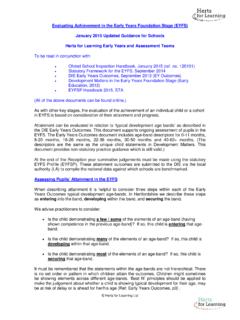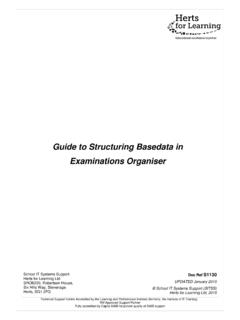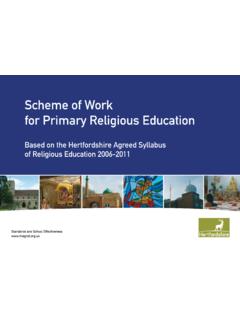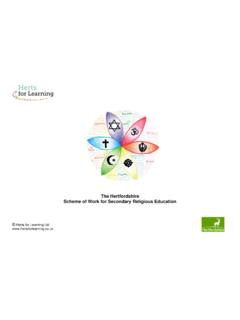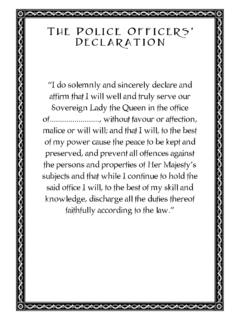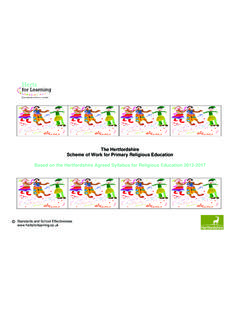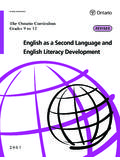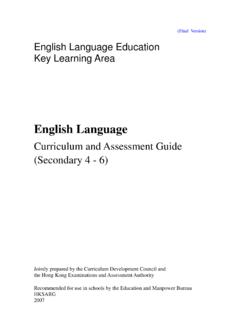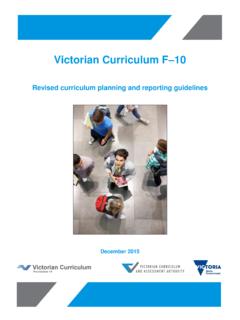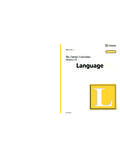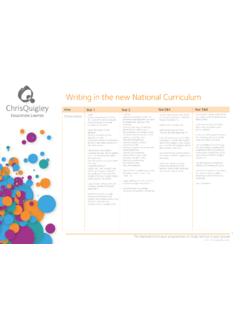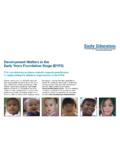Transcription of English - suggested long term planning years 1 to 6
1 Herts for Learning Ltd - 2014 English suggested long term planning years 1 to 6 Herts for Learning Ltd01438 for Learning - Teaching and LearningHerts for Learning - Teaching and Learning Herts for Learning Ltd - 2014 The long Term Plans allow for two planning approaches: planning which follows the teaching sequence for writing: Designed to follow the three phases of the teaching sequence, leading to a quality written based planning using a text as a stimulus ( Take One Book ): Allows teachers a wider creative freedom and an enhanced opportunity to focus on the reading for pleasure element of the curriculum. One book is chosen, and from this, a variety of outcomes could be produced, and links made across the curriculum where appropriate. Both approaches are designed to be tailored to the needs of the children through ongoing assessment/national Modules - The long term plans are designed to ensure whole school coverage of six non-fiction genres/text types.
2 There is alignment with other curriculum areas where children are expected to explain in science in year 1, an opportunity has been provided for the children to encounter an explanation module beforehand. The modules have been chosen to allow for the embedded teaching of the grammar statements for each year group the recount module in year 3 that allows for the use of present perfect verb forms. Modules have also been designed to take account of any mention of specific text types in the English Reading Comprehension and Writing Composition Programmes of Study the curriculum places emphasis on fairy stories and traditional tales from years 1 to 4 and this is reflected in the narrative module titles. Where possible, titles also reflect terminology of the National Curriculum predictable phrasing in year 1.
3 The non-fiction provision map provides a graphic illustration of the time allocated to each non-fiction module and the coverage across Key Stages 1 and 2. Fiction modules - As the children progress through Key Stage 2, narrative units vary their focus from plot in years 1, 2 and 3 to other aspects of narrative writing such as characterisation and creating atmosphere. In every year group, opportunities have been planned for children to write complete - Three aspects of poetry are addressed in each year group: vocabulary building; structure Haiku and poetry appreciation (Take one Poet where children can become familiar with a poet appropriate for their year group). Opportunities for performance and recital should occur regularly throughout the suggested written outcomes have been chosen to ensure a variety of outcomes throughout the Key Stages and may also incorporate learning from other curriculum areas.
4 These also, as mentioned above, are designed to facilitate embedded teaching of for Learning - Teaching and LearningHerts for Learning - Teaching and Learning Herts for Learning Ltd - 2014 English Modules year 1 Term 1 Term 2 Term 3 NarrativeStories with predictable phrasing(6 weeks or 2 + 2 + 2 weeks) Take One Book (1 or 2 weeks)One (or more) written outcomes, linked with fiction/non-fiction modules already covered during the termContemporary fiction stories reflecting children s own experience(4 weeks or 2 + 2 weeks) Take One Book (1 or 2 weeks)One (or more) written outcomes, linked with fiction/non-fiction modules already covered during the termTraditional Tales - Fairy tales(6 weeks or 2 + 2 + 2 weeks) Take One Book (1 or 2 weeks)One (or more) written outcomes, linked with fiction/non-fiction modules already covered during the termSuggested final written outcomeWrite simple sentences using patterned language, words and phrases taken from familiar storiesWrite a series of sentences to retell events based on personal a re-telling of a traditional , lists and captions1 weekRecount2 weeks - or 1 + 1 weekReport 2 weeksInstructions2 weeksReport 2 weeksExplanations 2 weeksSuggested final written outcomeWrite labels and sentences for an in-class exhibition/museum displayWrite simple first person recounts based on personal experience, using adverbs of time to aid sequencing A simple non-chronological report with a series of sentences to describe aspects of the subject.
5 Distinguish between a description of a single member of a group and the group in generalFollowing a practical experience, write up the instructions for a simple recipeA simple non-chronological report with a series of sentences to describe aspects of the subject; distinguish between a description of a single member of a group and the group in generalDraw pictures to illustrate a simple process and prepare several sentences to support the explanationPoetryVocabulary building(1 week)Structure rhyming couplets(1 week)Vocabulary building(1 week)Structure rhyming couplets(1 week)Vocabulary building(1 week)Take one poet poetry appreciation(1 week) suggested outcomeRead, write and perform free verse Recite familiar poems by heartRead, write and perform free verseRecite familiar poems by heart.
6 Not read, write and perform free verseRead, write and perform free versePersonal responses to poetryRecite familiar poems by heartHerts for Learning - Teaching and LearningHerts for Learning - Teaching and Learning Herts for Learning Ltd - 2014 English Modules year 2 Term 1 Term 2 Term 3 NarrativeTraditional Tales - Fairy Tales(4 weeks or 2 + 2 weeks) Take One Book (1 or 2 weeks)One (or more) written outcomes, linked with fiction/non-fiction modules already covered during the termStories with recurring literary language(4 weeks or 2 + 2 weeks) Take One Book (1 or 2 weeks)One (or more) written outcomes, linked with fiction/non-fiction modules already covered during the termTraditional Tales - Myths (creation stories) (4 weeks - or 2 + 2 weeks) Take One Book (1 or 2 weeks)One (or more)
7 Written outcomes, linked with fiction/non-fiction modules already covered during the termSuggested final written outcomeWrite a re-telling of a traditional a familiar story as a model to write a new a creation myth based on ones read how the zebra got his weekRecount2 weeks - or 1 + 1 weekReport4 weeks or 2 + 2 weeksInstructions 2 weeksExplanations 2 weeksSuggested final written outcomeFollowing practical tasks, produce a simple flowchart or cyclical diagram and record a series of sentences to support the explanationWrite first person recounts re-telling historical events, using adverbs of time to aid sequencing, and maintaining consistency in tense and person Assemble information on a subject, sorting and categorising information; use comparative language to describe and differentiateWrite a series of fiction-based instructions ( How to trap an ogre ), including a flowchart, ensuring content is clearly sequencedPoetryVocabulary building (list poems)(2 weeks)Structure calligrams(1 week)Vocabulary building(1 week)Structure calligrams(2 weeks - or 1+1weeks)Vocabulary building(1 week)Take one poet poetry appreciation(2 weeks) suggested outcomeRead list poems.
8 Write and perform own own calligrams (based on single words)Read, write and perform free verseWrite own calligrams (shape poems)Read, write and perform free versePersonal responses to poetryRecite familiar poems by heartHerts for Learning - Teaching and LearningHerts for Learning - Teaching and Learning Herts for Learning Ltd - 2014 English Modules year 3 Term 1 Term 2 Term 3 NarrativeTraditional Tales - Fables(2 weeks or 2 + 2 weeks)Writing and performing a Play(2 weeks) Take One Book (2 weeks)One (or more) written outcomes, linked with fiction/non-fiction modules already covered during the termTraditional Tales fairy tales (alternative versions)(3 weeks) Take One Book (2 weeks)One (or more) written outcomes, linked with fiction/non-fiction modules already covered during the termAdventure stories(5 weeks) Take One Book (2 weeks)One (or more) written outcomes, linked with fiction/non-fiction modules already covered during the termSuggested final written outcomeWrite a new fable to convey a and perform a play, based on a familiar storyWrite a traditional tale from a key characters an adventure story, focusing on weeksInstructions giving directions 2 weeksExplanations2 weeksReport3 weeksPersuasion - persuasive letter writing3 weeksSuggested final written outcomeWrite a news/sports report of an unfolding event ( commentary)
9 , including detail expressed in ways that will engage the reader/viewerWrite and evaluate a range of instructions, including directions a treasure huntCreate and use a flowchart to write an explanation of a process, ensuring relevant details are included and accounts ended effectivelyTeacher demonstrates research and note-taking techniques using information and ICT texts on a subject and using a spidergram to organise the information. Present a point of view in the form of a letter linking points persuasively and selecting style and vocabulary appropriate to the readerPoetryVocabulary building(2 weeks)Structure limericks(1 week)Vocabulary building(1 week)Structure haiku, tanka and kennings (2 weeks)Vocabulary building(1 week)Take one poet poetry appreciation(2 weeks)
10 suggested outcomeRead, write and perform free verse Recite familiar limericks by heart Read, write and perform free verseRead and write haiku, tanka and kennings Read, write and perform free verseResearch a particular responses to poetryRecite familiar poems by heartHerts for Learning - Teaching and LearningHerts for Learning - Teaching and Learning Herts for Learning Ltd - 2014 English Modules year 4 Term 1 Term 2 Term 3 NarrativeTraditional Tales - Myths (quests)(4 weeks) Take One Book (2 weeks)One (or more) written outcomes, linked with fiction/non-fiction modules already covered during the termThis could include non-fiction text types not taught as a unit in this year group ( recounts, instructions)Writing and performing a play(2 weeks)Story settings(3 weeks) Take One Book (2 weeks)One (or more) written outcomes, linked with fiction/non-fiction modules already covered during the termThis could include non-fiction text types not taught as a unit in this year group ( recounts, instructions)A story/stories with a theme(4 weeks) Take One Book (2 weeks)One (or more) written outcomes, linked with fiction/non-fiction modules already covered during the termThis could include non-fiction text types not taught as a unit in this year group ( recounts, instructions) suggested final written outcomeWrite a Greek myth focusing on effective characterisation descriptions (in the style of: a Wanted poster; lonely hearts advert; job application).
